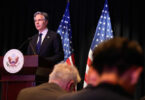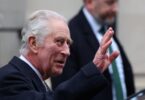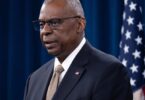F.P. Report
NEW DELHI: Indian Minister of External Affairs Dr. S. Jaishankar has said that Secretary Blinken and I just concluded our discussions, and we welcome the opportunity to brief all of you. Our meeting takes place at an important juncture when key global and regional challenges need to be effectively addressed. That our bilateral partnership has advanced to a level that it enables us to deal collaboratively with larger issues is a matter of particular satisfaction.
Now, you’re all aware of the extent of transformation of our relationship in recent years. Prime Minister Modi and President Biden have spoken numerous times and participated in summits of the Quad, G7, and climate leaders this year. And Secretary Blinken and I, the two of us, we are actually meeting, I think, for the fourth time this year.
As foreign ministers, it is our responsibility to regularly review cooperation in different domains and keep our leaders apprised of the progress in our ties, and that is exactly what we have done today.
Whether it is responding to the COVID challenge, cooperating on defense and security, encouraging trade and investment, addressing climate change, or expanding education innovation, I can say truly that there is much that has happened in 2021.
The COVID issue was naturally a particular priority, so let me first acknowledge the responsiveness of the Biden administration to keeping the raw materials supply chain open for vaccine production in India, and then say a big thanks for the support we received during the COVID second wave from the United States, a support that I would say was truly exceptional.
We focused today on expanding vaccine production to make it globally affordable and accessible. We also discussed travel challenges resulting from COVID. The U.S. has been very forthcoming on students. I really appreciate all the trouble that the State Department and the embassy has gone to in that regard, and I very much hope will take a sympathetic view of other travelers in the days to come.
We spoke at length about regional concerns, multilateral institutions, and global issues. The expanding Indian footprint, be it in Africa, Southeast Asia, Caribbean, or the South Pacific, has naturally broadened our shared agenda. Among the many issues that we looked at, I would specifically note Afghanistan, the Indo-Pacific, and the Gulf.
Regarding Afghanistan, it is essential that peace negotiations are taken seriously by all parties. The world wishes to see an independent, sovereign, democratic, and stable Afghanistan at peace with itself and with its neighbors. But its independence and sovereignty will only be ensured if it is free from malign influences. Similarly, unilateral imposition of will by any party will obviously not be democratic and can never lead to stability, nor indeed can such efforts ever acquire legitimacy.
The gains to Afghan civil society, especially on the rights of women, minorities, and on social freedoms over the last two decades, are self-evident. We must collectively work to preserve them. Afghanistan must neither be home to terrorism nor a source of refugees.
On the other side of India, the Indo-Pacific presents a different set of challenges to stability, growth, and prosperity. Under the aegis of the Quad framework, we are engaged on maritime security, HADR, counterterrorism, connectivity on infrastructure, cyber and digital concerns, COVID-19 response, climate action, education, and resilient and reliable supply chains.
The Secretary and I discussed not only opportunities for further collaboration on all these issues but also the importance of observing international law and rules and norms, including UNCLOS. Our ability to work more closely bilaterally in the Quad and elsewhere benefits the international community as a whole.
Developments in India’s extended neighborhood are also naturally of great consequence to us. Stability in the Gulf, where our political, economic, and community interests are so visible, was a shared concern.
On Myanmar, I conveyed our commitment to its democratic transition as well as our support for ASEAN initiatives.
India and the United States are currently both members of the UN Security Council. Some of the agenda before the UNSC was also covered in our discussions, as also our approach to reformed multilateralism. Countering terrorism has been the common endeavor for us in the UN framework, bilaterally and in other bodies. We are convinced that the world will never accept cross-border terrorism.
As regards climate change, the Agenda 2030 Partnership that Prime Minister Modi and President Biden launched in April strengthens our commitment to meet Paris goals. Taking forward its clean energy and finance mobilization tracks is therefore vital.
Given the comprehensive and global nature of our strategic partnership, it is to be expected that our two countries would engage on major contemporary issues. Such conversations are not only essential in a democratic, diverse, and multipolar world but actually affirm that we have entered a new era. We approach this pluralism through the lens of our own contexts, convictions, and cultures.
Secretary Blinken and I have been very much part of the journey that has brought our two nations so close today. Our ties obviously serve our national and mutual interests well, but more important, make a real difference to the world and the big issues of our times.
Meanwhile, US Secretary of State Antony J. Blinken has said on the occasion that It’s a real pleasure to be back in India. I was just thinking that the first time I came here was 40 years ago with my family. I’m here now in a somewhat different circumstance, but it’s wonderful to be here. And I especially want to thank Foreign Minister Jaishankar, all of our colleagues in government, and some of the individuals I’ve had the opportunity to meet already today, for an incredibly warm welcome. The minister and I have a partnership and friendship going back some years, and I have to say it’s one of the particular pleasures of my job to be able to work with you on a regular basis.
There are few relationships in the world that are more vital than the one between the United States and India. We are two of the world’s leading democracies, and our diversity fuels our national strength. We are two of the world’s largest economies powered by the innovative spirit of our people. At a time of rising temperatures and sea levels, we – two of the world’s largest carbon emitters – are on the front lines of the climate crisis and the leading edge of a new green economy. Our countries know firsthand the lethal consequences of climate change.
And the Indian and American people are united by millions of family ties stretching back generations and by shared values and shared aspirations. Together, the actions of – that India and the United States take are shaping the 21st century and beyond. That’s why strengthening the partnership with India is one of the United States’ top foreign policy priorities. That’s been the case for the past several presidential administrations, Democrat and Republican alike.
And President Biden feels a deep personal commitment to making our friendship with India as strong and as effective as it can be. We believe this partnership will be critical for delivering stability and prosperity in the Indo-Pacific region and beyond, and for showing the world how democracies can deliver for their people. And we believe that there’s a good deal that we can accomplish together on so many fronts, including in the near term.
As the minister said, we discussed a number of critical issues today, COVID-19 being at the top of the agenda. It’s hit both of our countries very, very hard. We remember with gratitude and we will not soon forget the aid and assistance that India provided to us in the early days of COVID-19 when our hospitals were overwhelmed early in the pandemic.
And I’m proud that we could help return the gesture of friendship. Over the past few months, the United States Government has contributed more than $200 million to India for COVID-19 relief, and there’s been a huge outpouring from individual Americans from the private sector in support as well.
Today, I am pleased to announce that the United States Government will send an additional $25 million to support vaccination efforts across India. This funding will contribute, I think, to saving lives by strengthening vaccine supply chain logistics, addressing misinformation and vaccine hesitancy, and helping to train more health care workers.
We’re determined to end this pandemic, and India and the United States will work together to do it, including through the Quad vaccine partnership, which will bring safe and effective vaccines to others across the region.
And I believe, too, that as we move forward, India and the United States together around the world will be leaders in bringing this pandemic to an end and, I hope, setting up an even stronger global health security system going forward so that we’re in a better position should the next pandemic come around.
We also have to address the very painful secondary consequences of the pandemic. To fuel our economic recovery, India and the United States must continue to grow our trade relationship, and beyond that we have to keep working through the barriers that stand in the way of greater bilateral investment and deeper commercial ties. That’s something we talked about today as well. If we create the right conditions from more trade and investment and innovation, there really is no limit to what our private sectors can achieve together.
The minister and I also discussed strengthening our regional cooperation, both bilaterally and through the Quad with Japan and Australia as well as other multilateral partnerships. So much of the future of the 21st century will be written in this part of the world. We share a vision – India and the United States – of a free, open, secure, and prosperous Indo-Pacific. We’ll work together to make that vision a reality.
And we’ll continue to advance peace, security, and development worldwide and to work in international organizations to strengthen a rules-based international order. Just to come back to one example, the Quad countries, as the minister noted, are focused together on dealing effectively with COVID-19, on advancing the climate agenda, on dealing with emerging technologies. And we’re bringing our experts together on a number of other vitally important issues to this region and beyond, including infrastructure, supply chains, maritime security.
We discussed regional security issues, as the minister noted, including Afghanistan. India and the United States share a strong interest in a peaceful, secure, and stable Afghanistan. As a leader and critical partner in the region, India has made and will continue to make vital contributions to Afghanistan’s stability and development, and we’ll continue to work together to sustain the gains of the Afghan people and support regional stability after the withdrawal of Coalition forces from the country.
And indeed, we talked about the climate crisis as well. Earlier this year, we launched the U.S.-India Climate and Clean Energy Agenda 2030 Partnership to help achieve our ambitious 2030 targets: for the United States, slashing greenhouse gas emissions in half, for India, installing 450 gigawatts of renewable energy capacity among other targets. That’s nearly twice the amount of renewable energy capacity that the entire world added in 2020. It would demonstrate to emerging economies that economic development and a cleaner economy go hand in hand.
Today’s conversations, including my meeting earlier today with National Security Advisor Doval and my meeting later today with Prime Minister Modi, are valuable, important opportunities to carry our cooperation forward.
Defense Secretary Austin and I are looking forward to hosting Minister Jaishankar and Defense Minister Singh later this year in Washington for the annual 2+2 Dialogue. That’s a critical forum for our two countries to deepen our strategic and security partnership.
Finally, our bilateral relationship is strengthened by our shared values. As two of the world’s leading democracies, we take seriously our responsibilities to deliver freedom, equality, and opportunity to all of our people. And we know that we must constantly do more on these fronts. Neither of us has achieved the ideals that we set for ourselves. Part of the promise of democracy is the constant striving for better. As America’s founders put it, to form a more perfect union, to always seek to strengthen our democratic institutions, expand access to justice and opportunity, stand up forcefully for fundamental freedoms. Those values are the heart of our democratic systems. They’re at the core of the vast array of partnerships connecting our countries, not only between our governments but also between our private sectors, universities, civil societies, and most of all between our people.
One last thing. To prepare for my visit today, I looked back on an earlier visit to India by an American leader. In 2006, then-Senator Joe Biden was here, and during that visit to India he said, and I quote, “My dream is that in 2020 the two closest nations in the world will be India and the United States. If that occurs, the world will be safer.” Well, it’s 2021. Joe Biden is President of the United States; the friendship between India and the United States is one of the most consequential in the world. And we, too, look to the future, to 2030 and beyond, because once again, the choices and investments that we make today can produce a healthier, more peaceful, more prosperous, more democratic future for our children and for the world. That’s the opportunity before us, and that’s what the people of India and the United States will work together to achieve.






